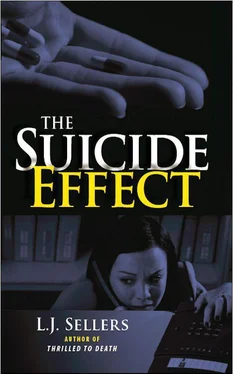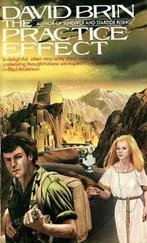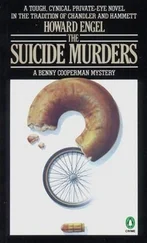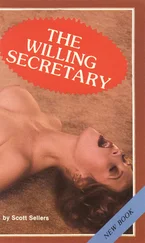L Sellers - The Suicide Effect
Здесь есть возможность читать онлайн «L Sellers - The Suicide Effect» весь текст электронной книги совершенно бесплатно (целиком полную версию без сокращений). В некоторых случаях можно слушать аудио, скачать через торрент в формате fb2 и присутствует краткое содержание. Жанр: Триллер, на английском языке. Описание произведения, (предисловие) а так же отзывы посетителей доступны на портале библиотеки ЛибКат.
- Название:The Suicide Effect
- Автор:
- Жанр:
- Год:неизвестен
- ISBN:нет данных
- Рейтинг книги:3 / 5. Голосов: 1
-
Избранное:Добавить в избранное
- Отзывы:
-
Ваша оценка:
- 60
- 1
- 2
- 3
- 4
- 5
The Suicide Effect: краткое содержание, описание и аннотация
Предлагаем к чтению аннотацию, описание, краткое содержание или предисловие (зависит от того, что написал сам автор книги «The Suicide Effect»). Если вы не нашли необходимую информацию о книге — напишите в комментариях, мы постараемся отыскать её.
The Suicide Effect — читать онлайн бесплатно полную книгу (весь текст) целиком
Ниже представлен текст книги, разбитый по страницам. Система сохранения места последней прочитанной страницы, позволяет с удобством читать онлайн бесплатно книгу «The Suicide Effect», без необходимости каждый раз заново искать на чём Вы остановились. Поставьте закладку, и сможете в любой момент перейти на страницу, на которой закончили чтение.
Интервал:
Закладка:
So much weighed on his mind. The council vote had been close: four to three. The big surprise had been Walter Krumble of district four. He was an old conservative-by Eugene standards-who liked the status quo. He rarely sided with any kind of change, progressive or not. As Krumble liked to say: “Yes votes mean spending more of the taxpayers’ money.”
Why had the old man gone along? Cricket always suspected the worst of big business and this was no exception. Krumble had been pressured, he was sure. But what could he do now? If the environmental report came back with a watered-down analysis that said, “Go right ahead, the birds can move and the frogs don’t mind the poison,” then the foundation would be poured. They were out there digging it right now “in anticipation” of a green light.
It was time to get serious. Cricket slowly rose to his feet and stretched his legs from their lotus position. He had to mobilize people who could commit to a long-term camp out. He needed to arrange a support group to bring in food and water. It would take several days to get it all going, but that would give the bulldozers time to finish digging. His Love the Earth group would slip in after hours between the digging and the pouring and make themselves at home.
Robbie heard the phone ringing but couldn’t wake himself up enough to answer. He felt drugged, unable to think straight. Yet his mind wouldn’t shut down into complete unconsciousness either. He drifted, his brain floating from one scrambled memory to another. Next he was falling down the side of a mountain, rolling and smashing into shrubs and rocks.
Jason’s voice boomed in his ears. “Robbie! Wake up!” His head was lifted up, but his eyes wouldn’t open. Thumbs pulled back his lids. A bright light flooded his eyes and made the muscles in his temples hurt. He fought to close his lids.
“Hey. You’re scaring me. Wake up!” Jason pinched his cheeks and dragged him to his feet. Robbie realized he was in their dining room. He felt too weak to stand, but Jason wouldn’t let him go. He sensed himself being dragged, then a blast of cold air hit him. The shivers brought his body to attention. His legs became responsive and began to carry some of his own weight. After walking for a while, the oxygen helped bring his brain around. He realized Jason was asking him the same question over and over: “Did you take any of those pills?”
What pills? Robbie shook his head.
“Are you sure?”
He didn’t know. Random scenes and thoughts from that afternoon came back to him. He had tried to kill himself. Yet here he was, still alive. Robbie began to cry. He didn’t know if it was from relief or frustration.
Chapter 25
Thursday, April 22, 3:12 a. m
Sula woke in the middle of night to the loud repetitive calling of what she later learned were Coqui tree frogs. Hundreds of the creatures, all belting out “ko-kee,” over and over, created a cacophony of overwhelming noise. How did people sleep here? She remembered the open window and got up to close it. She gulped down some water from the sink, worried for a moment that it might not be safe to drink, then went back to bed.
She awoke again at 6:33 a.m. bathed in sweat. With the air conditioning off and the window closed, her stucco-walled room had heated up. She reopened the window, relieved to hear only the faint sound of the ocean and the familiar hum of traffic. The air was just as warm at six in the morning as it was at midnight. She loved it.
She realized the research clinic would not open for hours, so she decided to wander around and enjoy herself. If she had packed a suit, she would have gone for a swim. Instead, she showered and dressed in the shorts and t-shirt she’d packed after reading that the average year-round temperature in Puerto Rico was seventy-eight degrees.
The breakfast room offered complimentary bananas, muffins, and coffee and she helped herself to all three. A little later, Sula started down the Isle de Verde, a long business strip that ran parallel to the coast line.
Nestled among familiar fast food restaurants-Burger King, Kentucky Fried Chicken, Taco Bell-were small stucco shops with Spanish names that offered tourist take-homes. Sula checked out a few gift shops, selling mostly t-shirts, towels, and swimsuits. A pair of bright blue nylon shorts with orange dolphins made her think of Tate. She wondered if she and her son would ever take any vacations together. More than anything, she wanted to take him to Disneyland, to see the joy on his face at every ride and every familiar character.
She turned away from the children’s clothes and selected a pair of sunglasses. She had not thought to bring hers and the sun was brighter than she’d ever experienced.
Back out on the street, the morning was still quiet and few pedestrians were out and about. As the traffic on the strip picked up, she was surprised by how American the cars seemed. She smiled at the thought. Of course they were American, but were they made here or did they have to be imported? She imagined that many things had to be imported, including food like ice cream. It seemed unlikely that the island had any dairies.
What it did have were dozens of drug manufacturing plants. For decades, U.S. pharma companies had built factories in Puerto Rico to take advantage of its low wages and status as a commonwealth with no federal tax. At one point, half of all the prescriptions consumed in the United States were manufactured in Puerto Rico. Sula wondered what other industries were here. She checked her watch: 7:46. Time to head back. She intended to be at the clinic when it opened.
Sula’s taxi pulled up in front of a low-slung stucco building painted a pale creamy yellow. Fernandez Juncos Clinica was sandwiched between a Rite Aid and a restaurant offering “carne guisada puertorriquena” as the house specialty. Sula thought it ironic that a drug studies clinic would be next door to a pharmacy.
She paid the cab driver and asked him to return in an hour, then sat on a bench across the street. Soon she was sweating. The black skirt and beige suit jacket she’d changed into were too warm for the tropical climate, but fortunately she’d decided to skip the nylons.
A tall middle-aged woman approached the clinic and unlocked the door. Her red skirt and jacket set off her long dark hair. Sula guessed her to be in her mid-forties, and hoped she looked that good in twenty years. Felisa Quinton was the clinic’s director, a psychiatrist who had been born, raised, and educated on the island. Sula had stayed up the night before her flight, searching the internet and learning everything she could about the island, the clinic, and its staff. The person she really wanted to talk to was David Hernandez, the doctor who had supervised the Nexapra trial.
Sula forced herself to be patient, to let the woman get settled in with a cup of coffee before she barged in asking questions. After checking her watch for the third time, ten minutes had finally elapsed. She took a long deep breath as she stood. She’d tried to prepare herself for the possibility she might come away empty handed-after borrowing a small fortune and enduring six plane rides. The money would be a setback either way, but the idea that she would fail to find the data she needed to stop the trials was hard to accept.
Sula had gone back and forth a dozen times about how to approach the doctor and had decided to use the journalist scenario she had used with the clinic in Eugene. It was also mostly true. Her career goal was to be an investigative reporter, and this was her first story. She intended to write about her experience, regardless of the outcome, and hoped to get the story published.
She stepped toward the street and waited for a pink convertible with a group of young girls to pass by. A minute later, she entered the air-cooled clinic. Cream-colored walls alternated with sage green, and a plush maroon couch invited visitors to sit. The soothing sound of water rippling over rocks served as background music. The effect was quite calming. Sula imagined a fountain in the courtyard, surrounded by big, brightly painted pots filled with ferns.
Читать дальшеИнтервал:
Закладка:
Похожие книги на «The Suicide Effect»
Представляем Вашему вниманию похожие книги на «The Suicide Effect» списком для выбора. Мы отобрали схожую по названию и смыслу литературу в надежде предоставить читателям больше вариантов отыскать новые, интересные, ещё непрочитанные произведения.
Обсуждение, отзывы о книге «The Suicide Effect» и просто собственные мнения читателей. Оставьте ваши комментарии, напишите, что Вы думаете о произведении, его смысле или главных героях. Укажите что конкретно понравилось, а что нет, и почему Вы так считаете.












